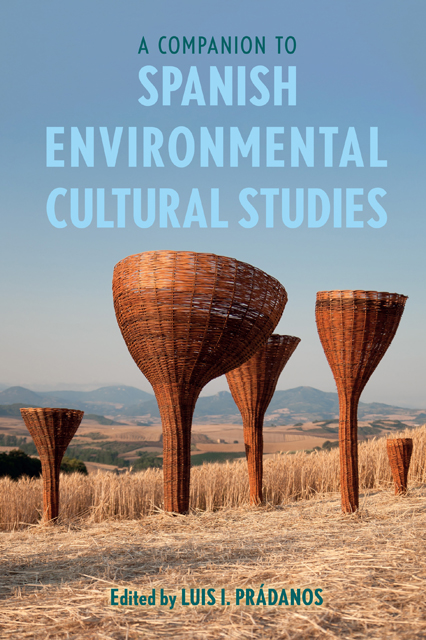Book contents
- Frontmatter
- Contents
- List of Illustrations
- List of Contributors
- Note on the Translations
- Acknowledgements
- Introduction: Spanish Environmental Cultural Studies
- Part I Environmental Cultural History and Political Ecology
- Part II Water and Power
- Part III Ecologies of Memory and Extractivism
- Part IV Animal Studies and Multispecies Ethnographies
- Part V Food Studies and Exploitative Ecologies
- Part VI Ecofeminism
- Part VII (Neo)Colonial and Racialized Ecologies
- Part VIII Tourism and the Environmental Imagination
- Part IX Eco-Mediation and Representation
- Part X Trash and Discard Studies
- Bibliography
- Index
1 - Political Ecology in Spain
Published online by Cambridge University Press: 08 June 2023
- Frontmatter
- Contents
- List of Illustrations
- List of Contributors
- Note on the Translations
- Acknowledgements
- Introduction: Spanish Environmental Cultural Studies
- Part I Environmental Cultural History and Political Ecology
- Part II Water and Power
- Part III Ecologies of Memory and Extractivism
- Part IV Animal Studies and Multispecies Ethnographies
- Part V Food Studies and Exploitative Ecologies
- Part VI Ecofeminism
- Part VII (Neo)Colonial and Racialized Ecologies
- Part VIII Tourism and the Environmental Imagination
- Part IX Eco-Mediation and Representation
- Part X Trash and Discard Studies
- Bibliography
- Index
Summary
Origins of Political Ecology in Spain
Political ecology analyzes power relations in society-environment interactions. It underlines the political character of socioenvironmental changes, uncovering their inequalities and examining a diverse range of topics, such as socio-environmental conflicts, social movements, commons and their governance, power relations linked to class, gender and race, and political struggles towards socioecological transformations, environmental justice, and bottom-up democracy. At the crossroads of environmental studies, political economy, geography, anthropology, and cultural studies, political ecology adopts an interdisciplinary theoretical perspective and methodological tools.
In Spain, the foundations of political ecology developed throughout the 1970s and 1980s, intimately linked to the emergence of the discipline of ecological economics and to social and political activism. The anti-Francoist publishing house Ruedo Ibérico, established in Paris by the anarchist José Martínez Guerricabeitia (1921–1986), published the first works of José Manuel Naredo and Joan Martínez-Alier, who would become key authors in the field. In the late 1970s, both participated in the coordination of the journal Cuadernos de Ruedo Ibérico, contributing to develop a critical environmental perspective. Between these years and the early 1980s, their research on the relation between energy and agriculture was key to developing a biophysical approach to economy that foreran later work on ecological economics.
Closely connected to this endeavour, one of the books published by Ruedo Ibérico in the late 1970s, Extremadura saqueada: recursos naturales y autonomía regional (1978), is regarded as the direct predecessor of political ecology in Spain. Following on the work coordinated by Mario Gaviria in the region of Aragón, this book was the result of collective, interdisciplinary research on the exploitation of the Extremadura region, which unveiled the relations of dependence and domination that made possible the appropriation of regional waters, as well as other agricultural, mining and energy resources. The book had a large impact and contributed to the mobilizations against the construction of a nuclear power plant in the region.
During the 1980s, the development of political ecology in Spain also benefitted from the dialogue established with ecosocialist and ecofeminist currents of thought, as formulated in the journal Mientras Tanto (1979), launched by Giulia Adinolfi and Manuel Sacristán.
- Type
- Chapter
- Information
- A Companion to Spanish Environmental Cultural Studies , pp. 35 - 42Publisher: Boydell & BrewerPrint publication year: 2023

